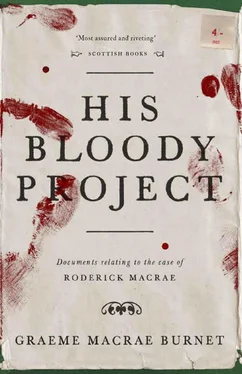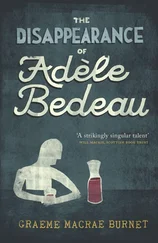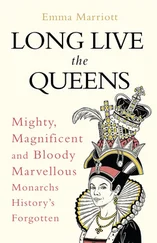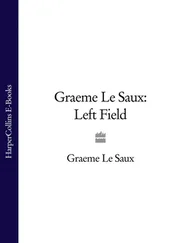‘What sort of queer ideas?’
‘I do not know.’
‘She did not tell you?’
‘No.’
‘Can you tell us what you were doing immediately before you met the prisoner and his friend, Archibald Ross, on the afternoon in question?’
‘We were taking a turn around the grounds of the Big House.’
‘And you were approached by Archibald Ross and the prisoner?’
‘Yes.’
‘And in what condition were they?’
‘They were drunk.’
‘Both of them?’
‘Roddy more so.’
‘How inebriated was he?’
‘He had difficulty speaking and he walked unsteadily.’
‘Nevertheless, you allowed them to accompany you?’
‘Yes.’
‘And you went with them into the woods near the burn?’
‘Yes. There did not seem any harm in it.’ The witness again began to weep.
‘So you did not think of the prisoner as a dangerous character; as someone who might do harm to you or to Flora?’
‘I did not know him.’
‘Please tell the court what occurred in the woods.’
‘When we reached the burn, Mr Ross took my arm and told me that he wanted to show me something and led me onto the bridge.’
‘And did the prisoner and Flora Mackenzie accompany you onto the bridge?’
‘They continued along the path by the burn.’
‘What happened then?’
‘Mr Ross leaned over the bridge and started talking about the trout and salmon in the river and pointed to the water, but I could not see any fish.’
‘Yes?’
‘Then he tried to kiss me.’
‘Where did he try to kiss you?’
Miss Farquhar did not answer, but touched her neck with her hand.
‘And did you let Mr Ross kiss you?’
‘I did not.’
‘What did you do?’
‘I drew away from him, but he held my arm and would not release me and then he made …’
‘Please continue, Miss Farquhar.’
‘He made an improper suggestion.’
‘A suggestion of a sexual nature?’
‘Yes, sir.’
‘I see. And then?’
‘I was frightened because he was gripping my arm. Then Flora came back along the path and he released me and we went away together.’
‘Was she running or walking?’
‘She was running.’
‘And did Flora Mackenzie tell you what had occurred when she had been alone with the prisoner?’
‘She told me that Roddy had said some coarse things to her and that he had put her hands upon her and that she had slapped him.’
Mr Gifford apologised for pressing her and then asked, ‘Did she indicate where the prisoner had put his hands?’
At this point, reported Mr Philby, the prisoner ‘became more agitated than at any previous point in the trial. His cheeks became quite crimson and he twisted his hands in his lap and seemed to shrink inside his own skin. If he admitted to no remorse for the murder of three people, he certainly appeared to feel some for the advances he had made towards the unfortunate Miss Mackenzie.’
The witness kept her eyes cast down and refused for some moments to answer.
‘Did Flora say, Miss Farquhar, that he had put her hands on the intimate parts of her body?’
She nodded and the Lord Justice-Clerk ordered that the record show that the witness had answered in the affirmative.
‘Anything else?’
‘No, sir.’
Mr Gifford then thanked her and concluded his questioning. Mr Sinclair declined to cross-examine the witness and she was excused.
The final witness called by the Crown was Hector Munro, MD, ‘a small plump man with mutton chop whiskers and a ruddy complexion’. He gave every appearance, wrote the sly Mr Philby, of ‘being a close acquaintance of a certain Mr J. Walker, esq.’.
Dr Munro gave his profession as general practitioner and stated that he was employed on a regular basis as medical officer to Inverness gaol.
Mr Gifford: ‘And what are your duties in this employ?’
Dr Munro: ‘To attend to the general health of the prisoners.’
‘And in this capacity were you required to examine the current prisoner, Roderick Macrae?’
‘I was.’
‘And did you do so?’
‘I did.’
‘And did you examine the prisoner with a view only to assessing his physical condition?’
‘No. I was requested by the Fiscal to assess the mental state of the prisoner.’
‘In order to ascertain whether the prisoner was of a sound state of mind?’
‘Yes.’
‘Can you tell the court something about the physical condition of the prisoner?’
‘I found him to be in generally good health, although suffering somewhat from scurvy, no doubt precipitated by poor diet.’
‘But he was otherwise in sound health?’
‘Yes. He was quite vigorous.’
‘Now, as to his mental condition, can you tell us by what means you sought to assess this?’
‘I conversed with the prisoner at some length.’
‘About the crimes for which he is here indicted?’
‘About these crimes, yes, and about his circumstances in general.’
‘And did the prisoner converse with you in a civilised manner?’
‘A most civilised manner, yes.’
‘And what was your assessment of the mental condition of the prisoner?’
‘I found him to be fully in possession of his reason.’
‘“Fully in possession of reason”,’ Mr Gifford repeated, placing great emphasis on these words. ‘And on what basis did you reach this conclusion?’
‘The prisoner was aware of his surroundings and why he was there. He answered my questions in a clear and deliberate manner and exhibited no signs of delusion or disorder in his reasoning. I would go as far as saying that he is among the most articulate and intelligent prisoners I have encountered.’
‘“Among the most articulate and intelligent prisoners you have encountered” — that is quite a statement, Dr Munro.’
‘It is my truthful opinion.’
‘And did you ask the prisoner specifically about the crimes with which he is charged?’
‘I did.’
‘And what was his response?’
‘He freely admitted responsibility for them.’
‘Might he have done this out of some desire to please you — because he might have believed that this was what you wanted to hear?’
‘I cannot speak to the prisoner’s motives, but, if I recall, I put the question to him in a quite neutral manner.’
‘In what manner?’
‘I told him that I heard about some crimes which had occurred in his village and asked him if he knew anything about them.’
‘And what was his response?’
‘He replied without hesitation that he was responsible.’
‘And did you ask him why he had committed these crimes?’
‘I did. He replied that he had committed these crimes in order to deliver his father from the tribulations which had been caused to him by the victim.’
‘The victim, Lachlan Mackenzie?’
‘Yes.’
‘And those were his words: “to deliver his father from the tribulations which had been caused to him”?’
‘I believe so, more or less.’
‘And did you ask him about the other victims?’
‘Not specifically.’
‘And did you think him truthful in his responses?’
‘I saw no reason to disbelieve him.’
‘Did you ask the prisoner any further questions relating to these crimes?’
‘I asked if he felt any remorse for what he had done.’
‘And how did he reply?’
‘He replied that he did not.’
‘He felt no remorse for the murder of three people?’
‘No, sir.’
‘Did this not strike you as unusual? Perhaps even as a sign that he was not fully in possession of his reason.’
‘In my experience, prisoners rarely express remorse for what they have done. Any feelings of regret they might feel are generally limited to the fact of their being apprehended.’
Читать дальше












